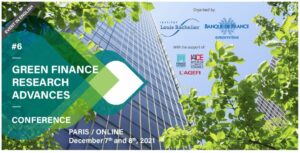Event I Green Finance Research Advances
Conferences - By : Anuschka HILKE / Michel CARDONA

The 6th edition tof the annual conference “Green Finance Research Advances”, organised by Banque de France in partnership with the Institut Louis Bachelier.
PROGRAMME EN ANGLAIS
TUESDAY DECEMBER 7TH
Afternoon session – Modelling the macroeconomics of the climate transition
2:00 – 2:05 pm Introductory remarks
Speaker: Jean Boissinot (Banque de France)
2:05 – 2:30 pm Keynote intervention “Climate policy is macroeconomic policy, and the implications will be significant” (2021)
Speaker: Jean Pisani-Ferry (Peterson Institute for International Economics, non-resident senior fellow)
Including Q&A session
2:30 – 4:45 pm A comparative analysis of modelling approaches to assess transition impacts
Moderator: Stéphane Dees (Banque de France)
2:30 – 2:50 pm Presentation by ADEME
Speakers: Gaël Callonnec et Florian Jacquetin
2:50 – 3:10 pm Presentation by SEURECO
Speaker: Baptiste Boitier
3:10 – 3:30 pm Presentation by CIRED
Speakers: Quentin Couix et Frédéric Ghersi
3:30 – 3:40 pm Comfort Break
3:40 – 4:00 pm Presentation by Banque de France
Speakers: Annabelle de Gaye et Noëmie Lisack
4:00 – 4:45 pm Discussion session and wrap-up
Moderator: Stéphane Dees (Banque de France)
WEDNESDAY DECEMBER 8TH
Morning Session
9:00 – 9:15 am Welcome remarks
Speaker 1: Nathalie Aufauvre (Banque de France)
Speaker 2: Jean-Michel Beacco (Institut Louis Bachelier)
9:15 – 9:55 am “In search of climate distress risk” (2021)
Speaker: Quyen Nguyen (Postdoctoral Fellow, University of Otago)
Authors: Quyen Nguyen, Ivan Diaz-Rainey and Duminda Kuruppuarachchi
Including Q&A session
9:55 – 10:35 am “Why do firms issue green bonds?” (2021)
Speaker: Julien Daubanes (University of Geneva (GSEM) and MIT (CEEPR))
Authors: Julien Daubanes, Shema Mitali and Jean-Charles Rochet
Including Q&A session
10:35 – 10:50 am Comfort Break
10:50 – 11:30 am “Mandatory climate-related disclosure by financial institutions and the financing of fossil energy” (2021)
Speaker: Jean-Stéphane Mésonnier (Sciences Po Paris, Banque de France)
Authors: Jean-Stéphane Mésonnier, Benoît Nguyen
Including Q&A session
11:30 – 12:10 pm Presentation (TBC)
Speaker: (TBC)
Including Q&A session
12:10 – 12:15 pm Wrap-up
Speaker: Stéphane Voisin (Institut Louis Bachelier)
Afternoon Session
2:00 – 2:30 pm Award of the Banque de France “Young Researchers in Green Finance”
Speakers: Emmanuelle Assouan (Banque de France)
Short presentation(s) by the Laureate(s)
2:30 – 3:10 pm Integrated economy-climate models and their uses for financial decision making
Speakers: Frédéric Ghersi and Peter Tankov
Authors: Jean-Charles Hourcade, Peter Tankov, Stéphane Voisin, Frédéric Ghersi, Julien Lefèvre
Including Q&A session
3:10 – 3:20 pm Comfort Break
3:20 – 4:20 pm Panel on climate scenario design
Panelists:
- Theresa Löber, Bank of England
- Laurent Clerc, Banque de France
- Mariana Escobar Uribe, Financial Superintendence of Colombia
- Dawn Holland, National Institute of Economic & Social Research
- Alexandre Köberle, Imperial College London
Moderator: Thomas Allen (Banque de France)
Including Q&A session
4:20 – 4:30 pm Concluding remarks
Speaker: Jean Boissinot
Organizers: ILB et Banque de France
